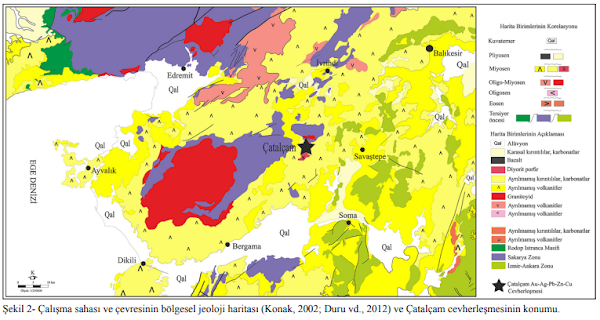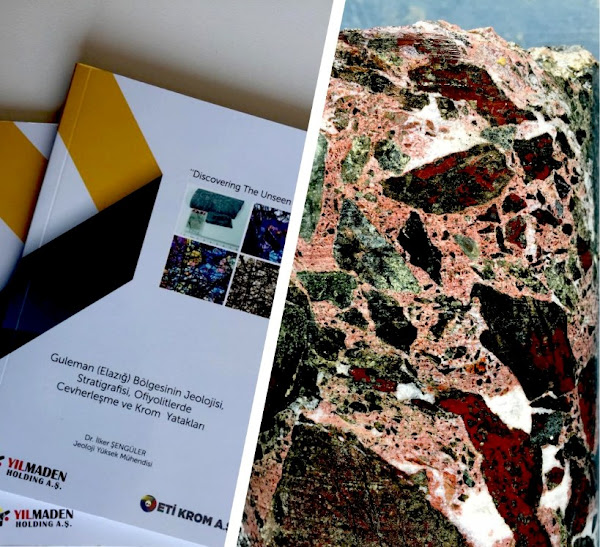Sınır
Tanımayan Madenler ve Madencilik
Dubai'deki Madencilik Fuarı'nda düzenlenen ve vizyonerleri bir araya getiren, derinlemesine diyalogları teşvik eden ve sektörümüzün geleceğine ışık tutan olağanüstü bir platform oluştu. Bu seçkin panelde katılımcıların bakış açılarını paylaşması ve böylesine düşündürücü sohbetlere katılması unutulmaz ve gerçekten ilham verici bir deneyimlere neden oldu.
Dünya,
medeniyetlerimizden o kadar eski çağlara dayanır ki, tüm insanlık tarihimiz
jeolojik zamana karşı geçici bir fısıltıdan ibarettir. Dağlar, dillerimiz var
olmadan önce yükseldi, okyanuslar ilk atalarımız güneşe gözlerini açmadan önce
oluştu ve mineraller, ilk insan taştan bir alet yapmadan çok önce, kadim
manzaraların altında kristalleşti. Bu ihtişamda, değişmez bir gerçek var: Dünya
sınırlarla yaratılmadı. Mineralleri uluslara tahsis edilmedi, metalleri de
belirli kabilelere veya bölgelere ayrılmadı. Bütün bu varlıklar; bir bütün
olarak insanlığa aittirler ve ortak varoluşumuzun evrensel temelidirler.
Mining Without Borders Model Attracts Worldwide Attention
I had the privilege of attending the Many Event at The Mining Show in Dubai a remarkable platform that unites visionaries, fosters insightful dialogue, and illuminates the future of our industry. Contributing my perspective on this distinguished panel and engaging in such thought-provoking conversations was an unforgettable and truly inspiring experience.
The Earth predates our civilizations by epochs so vast that our entire human story is a fleeting whisper against the geological clock. Mountains rose before our languages existed, oceans formed before our first ancestors opened their eyes to the sun, and minerals crystallized beneath primordial landscapes long before the first human shaped a tool of stone. In this grandeur, one truth stands immutable: the Earth was not created with borders. Its minerals were not assigned to nations, nor were its metals reserved for particular tribes or territories. They belong to humanity as a whole. They are the universal foundation of our shared existence.
This simple truth has shaped my entire understanding of the world. If nature itself draws no borders, then our stewardship of nature must rise above borders. Mining without borders is not a slogan. It is an ethical principle, a scientific necessity, and an economic imperative. It is the recognition that humanity’s survival and prosperity depend on collaboration that transcends geography. It is the acknowledgement that the Earth’s resources cannot be weaponized without ultimately harming every citizen of this planet. And it is the conviction that the role of industry is not to dominate nature but to learn from it, partner with it, and restore what has been damaged.
Yet our global reality often contradicts this clarity. Nations erect walls of suspicion and strategy where bridges of cooperation should stand. Trade becomes a battlefield disguised as diplomacy. Sanctions, tariffs, and resource restrictions masquerade as power but in truth reveal fear. When I look at the world, I see an interdependent organism—a planetary body in which every nation is an organ, every industry is a system, every supply chain is a vessel. A wound in one region weakens the entire body. A blockade in one artery compromises the circulation of global progress. Those who believe they can isolate themselves from the challenges of others misunderstand the very fabric of life.
Trade wars are among the most destructive illusions of our time. They inflict invisible damage. They undermine innovation. They stifle opportunity. And they violate the dignity of billions whose livelihoods depend on the open flow of goods, knowledge, and technologies. A world where resources are weaponized is a world where human prosperity is sacrificed on the altar of short-term political victory. Such a world cannot endure. Progress cannot thrive behind barricades.
Human civilization has advanced because we shared—ideas, tools, materials, discoveries. The printing press traveled across borders. So did medicine, mathematics, science, metallurgy, astronomy, agriculture. The progress of one civilization became the progress of all. This is the natural law of human advancement. When we forget this, we do not merely slow progress; we invite decline.
Today, the Earth calls us to remember. Environmental decline accelerates with every passing year. It is no longer a distant threat but a present reality. Toxic metals infiltrate soils, rivers, and human bodies. Air thickens with gases that erode lungs and destabilize climate systems. CO₂ accumulates in the atmosphere at rates unprecedented in human history. Oceans warm and acidify. Forests shrink. Species vanish. Deserts expand. We are living inside a global feedback loop of our own creation, one powered by industrial systems that extract but do not restore.
This is the defining challenge of our century. And the answer, I believe, lies not in abandoning industry but in transforming it. Nature holds the blueprint. Nature wastes nothing. Nature restores itself continuously. Nature converts harm into balance, toxins into stability, decay into new life. The task of our generation is to bring industry into harmony with these principles—to engineer human systems that operate with the same elegance and intelligence as natural systems.
For years, I have studied one of nature’s most remarkable minerals: magnesium olivine. In its crystalline silence lies a transformative power. When magnesium olivine interacts with water, air, and carbon dioxide, it performs a form of planetary alchemy. It permanently captures CO₂, turns acidity into neutrality, binds toxic metals into harmless solids, and revitalizes soils with essential nutrients. It is as though the Earth encoded within this mineral a mechanism for self-correction—a biological, geological, and chemical equilibrium system that only needed to be understood and activated.
My work has been guided by the belief that such natural processes, when enhanced through human ingenuity, can restore the Earth on a scale proportionate to the damage we have caused. The technologies we develop must operate without heavy energy input, without pollution, without artificial burden. They must be powered by the same forces that govern ecosystems—sunlight, rainfall, chemical equilibrium, biological intelligence. They must be self-sustaining, scalable, regenerative. And above all, they must align economic value with environmental restoration.
When industry becomes regenerative, abundance replaces scarcity. Pollution becomes raw material. CO₂ becomes stone. Heavy metals become inert. Toxic gases become minerals. Desertified lands become fertile. Degraded waters become drinkable. Ecosystems that seemed beyond repair return to life. This is not fantasy—this is chemistry, geology, biology, and engineering working in unity.
To support this transformation, new economic systems are required. Traditional finance has long failed to assign proper value to ecological restoration, despite the fact that the survival of every industry depends on the health of the biosphere. We need financial instruments that reward restoration, that measure carbon removal, that assign worth to clean water and fertile soil, that mobilize global capital toward regeneration. This is why I have built systems in which tokens of value correspond to measurable environmental action—currencies backed not by speculation but by minerals, technologies, and ecological impact. A currency should reflect responsibility, not merely profitability.
Leadership today demands more than ambition; it demands courage and clarity. Leadership is not a medal worn on the chest—it is a weight carried on the shoulders. It is the responsibility to act when action is difficult, to build when others hesitate, to imagine when others fear, and to move forward when the world demands change. Leadership is the willingness to see beyond the horizon of one’s own interests and to think in terms of generations, not quarters; civilizations, not markets.
Our era calls for a new kind of industrial leadership—one that understands that the Earth is not a warehouse of resources but a living system in which every extraction must be balanced by restoration. A leader must look at a mine and see not only a deposit of minerals but an opportunity to regenerate landscapes. A leader must look at pollution and see not a problem but a raw material awaiting transformation. A leader must look at global tensions and see not barriers but unfinished bridges.
The world stands at a crossroads. One path leads to fragmentation, scarcity, and decline. The other leads to cooperation, abundance, and regeneration. The future will be determined not by chance but by the courage of those willing to reshape the systems that no longer serve us. Those who embrace regenerative technologies, restorative economics, and borderless cooperation will build a civilization that thrives in harmony with the Earth rather than at its expense.
This is the work that guides me every day: to merge industry with ecology, to elevate economics into stewardship, to forge technologies that heal rather than harm, and to inspire a world where the prosperity of one strengthens the prosperity of all. The Earth has always known how to heal itself. Our task is to become humble students of its wisdom, to amplify its natural intelligence, and to design human systems that honor the rhythms of life rather than disrupt them.
Mining without borders is not only a vision for resource development—it is a vision for humanity. A vision in which borders no longer limit our cooperation, in which industry no longer threatens our environment, in which progress no longer demands sacrifice, and in which the Earth is understood not as property, but as partner.
The time for incremental adjustments has passed. The time for bold, regenerative action has arrived. The planet is offering us both a warning and an invitation. If we accept the invitation, if we act with intelligence, unity, and purpose, we can usher in a new era of abundance—an era in which the Earth flourishes and humanity flourishes with it.
This is the future I choose. This is the future we can build together.
Sahit Muja






Yorumlar
Yorum Gönder